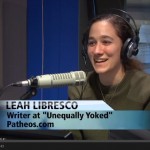Following a link from A Practical Heretic, I came across a rather bizarre portrait of religion at New Scientist. Kate Douglas appears to be working her way through a series titled “Starting Over” where she imagines how you would redesign certain institutions and conventions if you weren’t limited by prior practice. She’s looked at timekeeping, toilets, and voting, and this week she turned her attention to religion.
By the end of the article, she’s designed a faith that Alex Knapp described as “a Unitarian Universalist church with livelier services.” It seems like a pretty disappointing pick to me, so it’s worth taking a look at how she judged the worth of religion:
Today’s religions come in four flavours, according to Harvey Whitehouse, also at Oxford. First, the “sacred party”, such as incense burning, bell ringing and celestial choral music in Catholicism. Second, “therapy”: for example, the practices of healing and casting out devils among some evangelical Christians. Third, “mystical quest”, such as the Buddhist quest for nirvana. And finally, “school”: detailed study of the Koran in Islam or reading the Torah in Judaism.
While each appeals to a different sort of person, they all tap into basic human needs and desires, so a new world religion would have a harmonious blend of them all: the euphoria and sensual trappings of a sacred party, the sympathy and soothing balms of therapy, the mysteries and revelations of an eternal journey and the nurturing, didactic atmosphere of a school.
Those are the four most useful facets of religion? Well, now I’m really not worried about missing out. How can you list attributes of religion without talking about it as a truth-telling thing, as Chesterton put it? Why not talk about instilling practical wisdom?
None of the categories (which Bloch describes in a little more detail on his blog) are linked to the proper disposition of one’s life. His scholars are focuses on unified, memorized creeds, not philosophic inquiry, and the more free-form questing of his mystics is so otherworldly as to abandon relevance. Everything he and Douglas list is not dependent in any way on the existence of a force or being outside the material world. Communities, rituals, reflection, and scholarship all exist comfortably outside of any faith tradition. If these were the strengths of religion, atheism would be an easy sell.
I think of religion as a system of epistemology and ethics. The communal and ritual aspects are good insofar as they aid the project of truth seeking and character formation. Although I believe religious systems to be flawed, I give them full credit for this goal, rather than just a jolly Rotary club type atmosphere. I’d be curious whether commenters agree that Kate Douglas has overlooked the heart of religion, and what you think is essential for a religion to be a religion.












